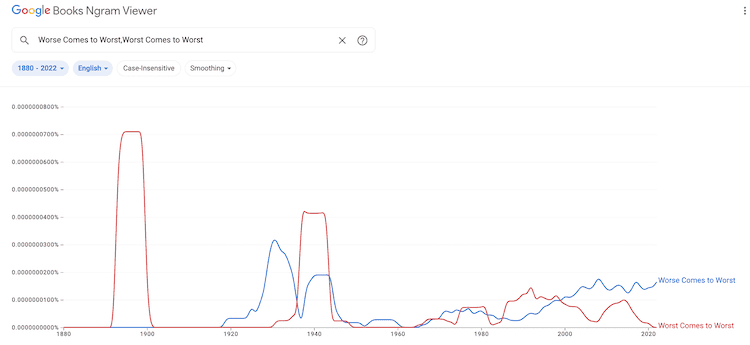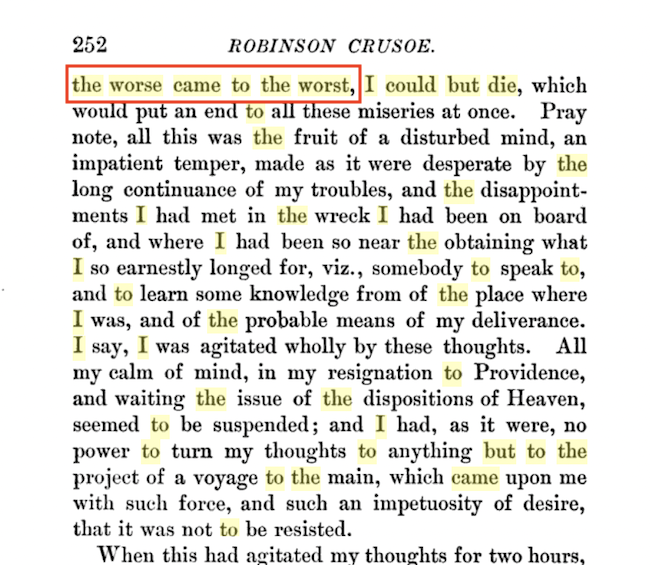
If you had asked me yesterday about this fixed expression, I would have said that when worse comes to worst is the correct form.
However, when I stumbled upon a text that used the phrase when worst comes to worst, I wondered if my assumption was correct.
The trouble with assumptions is that you can quite easily be tripped up, as I was on this point.
As it turns out, I wasn’t entirely wrong, but nor was I right about what I thought was the correct form of the expression.
The origin of the expression
The idiom worst comes to worst has been in use in written English since at least the 16th century.
One of the first recorded mentions is in a 1596 pamphlet entitled Have With You to Saffron-Walden by Thomas Nashe.

As you can see from the image above, it was written in Middle English. However, it’s worth noting that he used the definite article (the) for both parts of the expression.
It proves that the original expression was in the superlative form. But the history of English rules is full of changes and modifications.
Today, though, there is a belief that it doesn’t make sense.
That’s why using worse in the first part of the idiom gives a sense of change from one dire situation to one even more dire.
The usage graph below shows the changes over time and how the two forms have jumped around in use.

Whichever side of the fence you are on regarding this expression, you can rest easy in knowing that you are probably correct.
Explaining the two phrases
It makes little difference when we speak because unless you have perfect diction, it usually sounds like worse comes to worse.
In writing, however, the change of one letter makes all the difference.
The argument that using two superlatives together is illogical makes sense because it literally means when the most dire possibility becomes the most dire possibility.
But changing the first part to a comparative adjective seems to make better sense. Then, a more dire situation becomes the most dire situation.
While researching this subject, I came across some mentions that this expression was changed in later editions of Robinson Crusoe by Daniel Defoe.
After hunting through various editions, I discovered something strange.
In an 1895 edition, the expression in the book is the worse came to the worst.

However, in a 2002 edition, it reads the worst came to the worst.

Therefore, it seems that Defoe may have been one of the first writers to change the form of the expression to worse comes to worst instead of worst comes to worst.
But later, editors must have had a change of heart and reverted to the original form.
What does all this prove?
Well, very little other than that, it’s safe to say that either form is correct.
Are there any alternative expressions?
If you want to avoid or replace the expression, there are some possibilities you can use.
While these are not 100% exact replacements, they all have a similar intent.
In the worst-case scenario – A formal and concise way to highlight the most negative outcome.
If it all falls apart – A casual, informal way of describing a situation that may collapse completely.
Come what may – It suggests an acceptance of any outcome, even if it’s the worst one possible.
If things go south – Another very casual expression predicting that a situation may deteriorate considerably.
If the worst happens – A simple acknowledgment of a possible negative outcome.
These fixed expressions can be useful in certain contexts, but none of them are exactly the same as when worst comes to worst.
Summary
As I said at the start of this article, I thought I knew all I needed to know about this fixed expression.
But how wrong I was.
There is much more to it, and clearly, there is no right or wrong use in writing.
You can use the original version, which is slightly illogical. Or you can use the newer version which attempts to fix the logic issue.
But either way, you’ll be correct.
Related Reading: On Tenterhooks Or Tender Hooks?
Share This Article


